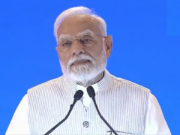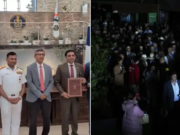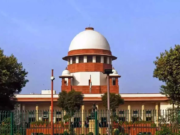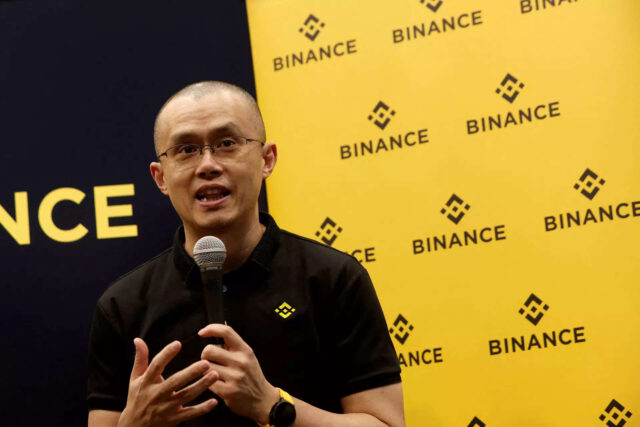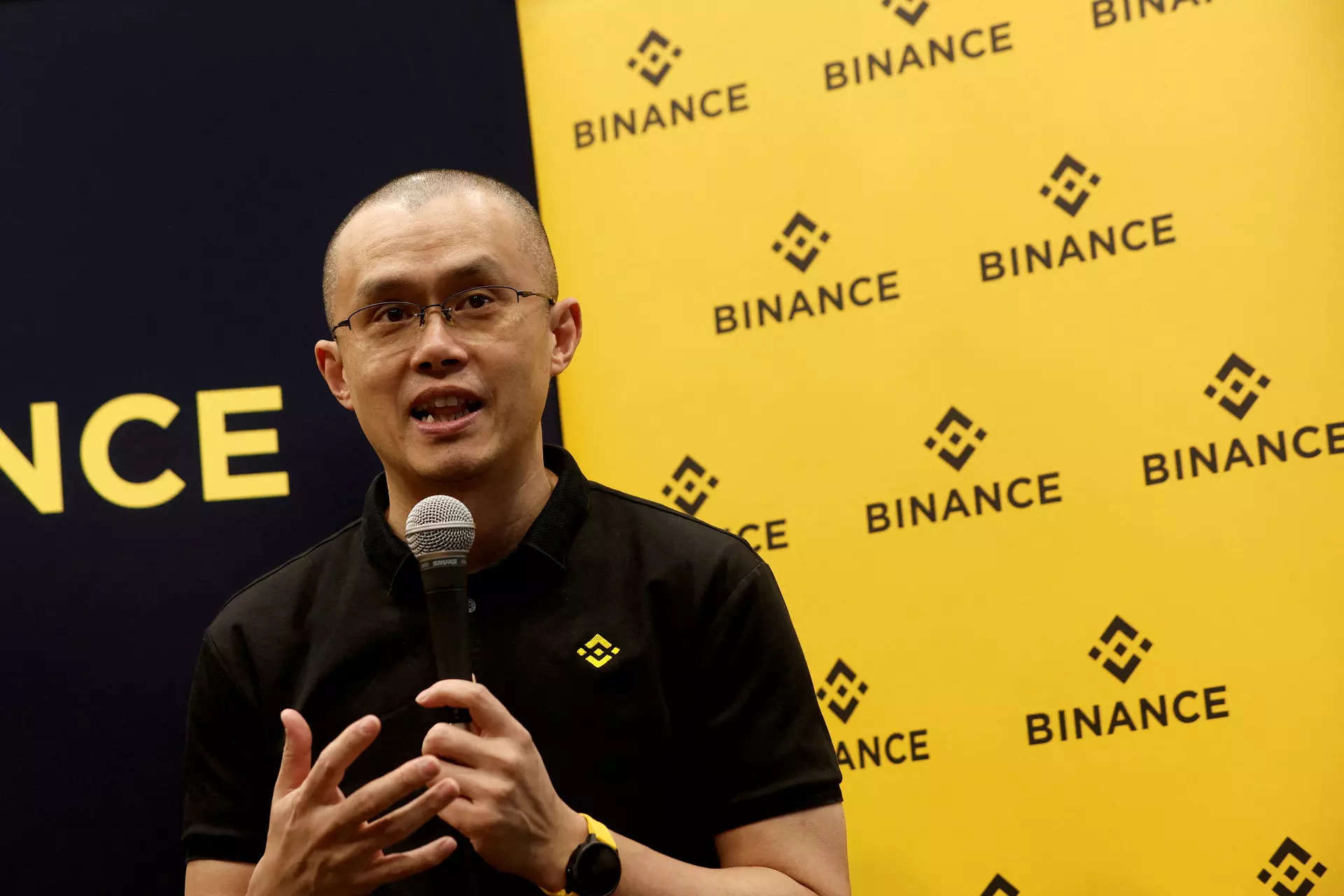
Binance co-founder Changpeng Zhao is facing up to three years in prison, if efforts by US prosecutors to secure his sentencing prove successful. More than 160 friends, colleagues and investors are determined for the crypto executive to escape incarceration entirely.
Totaling nearly 350 pages, a trove of letters submitted to a Seattle court by Zhao’s confidantes and co-workers on Wednesday provide insight into the private life of one of the world’s richest people.Among the authors are the two mothers of his five children, titans of industry both in and outside of crypto, government elites, old college buddies and dozens of his employees.
The list of names includes Fosun International co-founder Xinjun Liang, two members of ruling families in the United Arab Emirates, senior leaders at crypto miner Bitfury, the founder of venture capital firm Antler and former US ambassador to China Max Baucus, who serves on Binance’s advisory board. A number of current and former Binance executives also submitted letters, including all three external members of the exchange’s new board of directors who were appointed earlier this month.
Binance pleaded guilty to US anti-money-laundering and sanctions violations late last year, incurring $4.3 billion in penalties as well as having to agree to oversight from authorities. Zhao, who is better known by the moniker “CZ”, also pleaded guilty to anti-money-laundering failures and stepped down as CEO.
Zhao, 47, is the world’s 29th richest person and is worth about $43 billion, according to the Bloomberg Billionaire Index. Binance remains the world’s largest cryptocurrency exchange.
The letters describe a man uninterested in wealth, with multiple references to Zhao’s preference for affordable clothing from Amazon over luxury goods, dinners cooked by his aunt and taxi cabs over limousines. Yi He, Zhao’s current life partner and Binance co-founder, said the former CEO received a lower salary than other company executives, adding that hadn’t taken any dividends or cash from the business since its founding.
He’s also a family man. Friends described his various homes as often being covered in children’s toys, applauding Zhao’s closeness with his youngest offspring and elderly mother. “They are very close to him and now they are always asking: Why isn’t Dad home? When can Dad come back?” said Yi He of their children. “Of course, I’m not saying here that CZ did not make mistakes, but his biggest mistake was ignorance.”
At a dinner in December last year, Zhao’s teenage son Ryan confronted him about his crimes, one letter read. “I consciously avoided mentioning the case, wanting to provide a respite from his legal troubles,” recounted Ronghui Gu, co-founder of blockchain security firm CertiK and now an associate professor at Columbia University.
“The sudden silence that followed was palpable,” Gu said. “He [Zhao] acknowledged his mistakes and his guilt, emphasizing that making mistakes is not something to be ashamed of, but failing to confront and rectify those mistakes is.”
Business troubles
Several submissions came from industry executives and investors who’ve known Zhao for a number of years, recalling his staunchness for honesty and integrity in business dealings. When Zhao was chief technology officer of crypto exchange OKCoin in 2015, he resigned in protest at what Richmond Teo, co-founder of stablecoin issuer Paxos Trust Co., called “lapses in management and finance.” OKCoin denied the accuracy of Zhao’s allegations at the time.
“He received many threats and was an individual being publicly attacked by a large and deep pocketed corporation. I asked him to tone it down, but he refused because it was the truth,” wrote Teo, whose firm previously partnered with Binance on its now-defunct stablecoin BinanceUSD. “He made powerful enemies in the industry while standing his ethical grounds.”
Years later, an application by Binance to register its services with the Monetary Authority of Singapore was denied due to Zhao’s controlling shareholdings in other global Binance entities, according to Kee Lock Chua, CEO of Temasek-backed venture capital firm Vertex Venture Holdings.
“After much deliberation, we agreed to withdraw our application. CZ decided to fully refund our original invested cost despite Binance Singapore exhausting half of the invested capital,” said Chua. “This is an unexpected gesture by him and it showed his thoughtfulness and sense of fairness.”
Charity
Many of the letters in support of Zhao referred to numerous charitable donations made by Binance and Zhao. More than 50 employees from Binance’s Ukrainian workforce signed or authored letters, describing the company’s support of their relocation away from the country when Russia invaded its territory in early 2022.
Others referenced personal attributes as evidence of a down-to-earth character, such as Zhao’s preference for riding a scooter to meetings, his fondness for poker games and his time working at McDonald’s while in high school. Several letters talked of Zhao’s time in recovery from two spinal surgeries in 2020, during which he continued to work at Binance while being bedridden.
“When I visited him in 2020, I found him lying flat on his back in bed with a contraption he had made to hold his laptop in place over his face so he could continuously be on his computer while recovering,” said Teo. “He joked that his laptop had fallen on this face [sic] many times in earlier iterations.”
A three-year prison term would be double what Zhao was previously expected to serve under federal guidelines. With the letters of support as evidence alongside Zhao’s own apology and expertise from prison and security consultants, lawyers for Zhao argued he should receive probation instead.
In his own letter to the court, Zhao apologised for his actions. He also lamented having to let go of his life’s work in stepping down from Binance, adding that he hoped to focus on opportunities in education and biological technology innovation in future. “I assumed I would be doing that for the next several decades,” he said of his time at the helm. “That life no longer exists for me. It was difficult to come to terms with that at first, but I have accepted it.”
Totaling nearly 350 pages, a trove of letters submitted to a Seattle court by Zhao’s confidantes and co-workers on Wednesday provide insight into the private life of one of the world’s richest people.Among the authors are the two mothers of his five children, titans of industry both in and outside of crypto, government elites, old college buddies and dozens of his employees.
The list of names includes Fosun International co-founder Xinjun Liang, two members of ruling families in the United Arab Emirates, senior leaders at crypto miner Bitfury, the founder of venture capital firm Antler and former US ambassador to China Max Baucus, who serves on Binance’s advisory board. A number of current and former Binance executives also submitted letters, including all three external members of the exchange’s new board of directors who were appointed earlier this month.
Binance pleaded guilty to US anti-money-laundering and sanctions violations late last year, incurring $4.3 billion in penalties as well as having to agree to oversight from authorities. Zhao, who is better known by the moniker “CZ”, also pleaded guilty to anti-money-laundering failures and stepped down as CEO.
Zhao, 47, is the world’s 29th richest person and is worth about $43 billion, according to the Bloomberg Billionaire Index. Binance remains the world’s largest cryptocurrency exchange.
The letters describe a man uninterested in wealth, with multiple references to Zhao’s preference for affordable clothing from Amazon over luxury goods, dinners cooked by his aunt and taxi cabs over limousines. Yi He, Zhao’s current life partner and Binance co-founder, said the former CEO received a lower salary than other company executives, adding that hadn’t taken any dividends or cash from the business since its founding.
He’s also a family man. Friends described his various homes as often being covered in children’s toys, applauding Zhao’s closeness with his youngest offspring and elderly mother. “They are very close to him and now they are always asking: Why isn’t Dad home? When can Dad come back?” said Yi He of their children. “Of course, I’m not saying here that CZ did not make mistakes, but his biggest mistake was ignorance.”
At a dinner in December last year, Zhao’s teenage son Ryan confronted him about his crimes, one letter read. “I consciously avoided mentioning the case, wanting to provide a respite from his legal troubles,” recounted Ronghui Gu, co-founder of blockchain security firm CertiK and now an associate professor at Columbia University.
“The sudden silence that followed was palpable,” Gu said. “He [Zhao] acknowledged his mistakes and his guilt, emphasizing that making mistakes is not something to be ashamed of, but failing to confront and rectify those mistakes is.”
Business troubles
Several submissions came from industry executives and investors who’ve known Zhao for a number of years, recalling his staunchness for honesty and integrity in business dealings. When Zhao was chief technology officer of crypto exchange OKCoin in 2015, he resigned in protest at what Richmond Teo, co-founder of stablecoin issuer Paxos Trust Co., called “lapses in management and finance.” OKCoin denied the accuracy of Zhao’s allegations at the time.
“He received many threats and was an individual being publicly attacked by a large and deep pocketed corporation. I asked him to tone it down, but he refused because it was the truth,” wrote Teo, whose firm previously partnered with Binance on its now-defunct stablecoin BinanceUSD. “He made powerful enemies in the industry while standing his ethical grounds.”
Years later, an application by Binance to register its services with the Monetary Authority of Singapore was denied due to Zhao’s controlling shareholdings in other global Binance entities, according to Kee Lock Chua, CEO of Temasek-backed venture capital firm Vertex Venture Holdings.
“After much deliberation, we agreed to withdraw our application. CZ decided to fully refund our original invested cost despite Binance Singapore exhausting half of the invested capital,” said Chua. “This is an unexpected gesture by him and it showed his thoughtfulness and sense of fairness.”
Charity
Many of the letters in support of Zhao referred to numerous charitable donations made by Binance and Zhao. More than 50 employees from Binance’s Ukrainian workforce signed or authored letters, describing the company’s support of their relocation away from the country when Russia invaded its territory in early 2022.
Others referenced personal attributes as evidence of a down-to-earth character, such as Zhao’s preference for riding a scooter to meetings, his fondness for poker games and his time working at McDonald’s while in high school. Several letters talked of Zhao’s time in recovery from two spinal surgeries in 2020, during which he continued to work at Binance while being bedridden.
“When I visited him in 2020, I found him lying flat on his back in bed with a contraption he had made to hold his laptop in place over his face so he could continuously be on his computer while recovering,” said Teo. “He joked that his laptop had fallen on this face [sic] many times in earlier iterations.”
A three-year prison term would be double what Zhao was previously expected to serve under federal guidelines. With the letters of support as evidence alongside Zhao’s own apology and expertise from prison and security consultants, lawyers for Zhao argued he should receive probation instead.
In his own letter to the court, Zhao apologised for his actions. He also lamented having to let go of his life’s work in stepping down from Binance, adding that he hoped to focus on opportunities in education and biological technology innovation in future. “I assumed I would be doing that for the next several decades,” he said of his time at the helm. “That life no longer exists for me. It was difficult to come to terms with that at first, but I have accepted it.”



